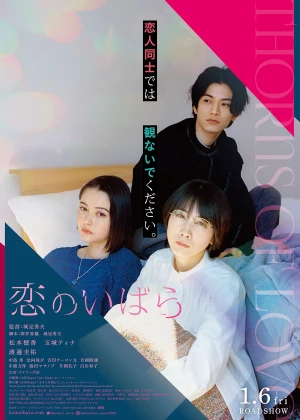Thorns of Love

Japan produces countless dramas each year, and keeping up with them is nigh impossible. It often comes down to a quick sample and an unshaken trust in one's gut feeling when picking which ones to watch. Hideo Jojo's Thorns of Love [Koi no Ibara] was a bit of a wild card choice, but sometimes these picks turn out surprisingly well. It's not that this is a film that throws the entire genre on its head, fans of Japanese dramas will feel right at home, but there are just enough creative touches and just the right amount of polish to make it stand out from its peers.
![screencap of Thorns of Love [Koi no Ibara]](/thumbs/img/articles/1200xauto/thorns-love-1.webp)
I'm not all that familiar with Hideo Jojo's previous work, but it's not for lack of output. Jojo has been going strong for at least two decades now, and he's directed close to 100 movies (western sources aren't entirely reliable about the exact number). Like many of his more notorious peers, Jojo started out directing pinku and horror cinema. Most of his early projects look a little sketchy, but if you're aware of the career paths of Japanese directors that's par for the course. It's no surprise then that when Jojo found more mainstream outlets, the quality turned out to be there.
Jojo has a reputation for aptly portraying male scumbags, for Thorns of Love he brought in a second (female) writer to tone things down a little. The result is a film with more nuanced characters, a love triangle where each of the protagonists has their hidden agenda and where no one is free from a little trickery. It's an interesting setup, especially as revelations are scattered throughout and each new twist adds a different dynamic to the triangle. It also enhances the drama and enriches the characters rather than turning the film into a gimmick or a pure mystery.
Riko believes her boyfriend Kentaro forgot about her birthday, so she is pleasantly surprised when he reveals her surprise party. The next day, Riko is approached by Momo, a girl who introduces herself as Kentaro's ex-girlfriend. Kentaro is a photographer by profession, and Momo confesses she had some private pictures taken of her, which she is afraid he'll use against her. At first, Riko isn't too interested in Momo's story, but then she remembers that Kentaro had a similar photoshoot with her. Intrigued by Momo's story, she seeks her out again, and together they devise a plan.
![screencap of Thorns of Love [Koi no Ibara]](/thumbs/img/articles/1200xauto/thorns-love-2.webp)
One of the things that sets this film apart from other dramas is the cinematography. It's not as intimate or soft as most Japanese films. Instead, Jojo chose to add some extra flair using a starker color palette and some lovely play with light. It's a choice I definitely welcome, combined with the slick camera work and the pointed editing it makes for a lush-looking film. Don't expect maximalist cinema, it's not that big of a departure, but people who've seen their fair share of Japanese dramas will notice the difference, and it's good to see them try a few different options.
The score is decent but noticeably more generic. There are some viable attempts to modernize it, especially during the dance and bar scenes, but it never felt as genuine as it should. The more typical drama music fares better. It's exactly what you'd expect from a film like this. Soft piano and string pieces, the go-to style for Japanese dramas, but they at least give off the right vibe. Props to Jojo for trying to make the music a tad more contemporary, there are some scenes where it could've worked very well, but it's clear that he didn't know how to pull it off.
Luckily the performances are spot on. Keisuke Watanabe is a perfect fit for the stylish yet somewhat sleazy womanizer, Honoka Matsumoto and Tina Tamashiro make for a lovely duo. They're almost complete opposites, yet their onscreen relationship is believable and the bond that grows between them feels sweet yet grounded. All three know how to play their part in the love triangle and even though the revelations don't necessarily make their characters more relatable, the actors make certain that the audience remains invested in their journeys.
![screencap of Thorns of Love [Koi no Ibara]](/thumbs/img/articles/1200xauto/thorns-love-3.webp)
The setup is pretty straightforward, but the script keeps throwing in little tidbits that shift the dynamic between the three leads. That in itself isn't too uncommon either, but it's interesting to see a film do this in regular intervals from start to finish. Usually, the twists are a bit more concentrated, either at the beginning or end of the film. It certainly kept me engaged with the plot, even though ultimately it was the relationship between the three that kept me hooked. Some might prefer a more core drama, while others may favor a stronger genre approach, I liked the balance between the two.
Thorns of Love is a bit of a hard sell, especially since few (non-Japanese) people are fully invested in Japanese cinema. It's a strong film that offers a different take on the classic drama niche, but unless you're fully aware of these differences the impact may be minimal. Still, the lovely cinematography, some very fine performances, and a series of fun little twists make certain that Thorns of Love will go down relatively easily for most people. I guess I'll have to make an effort to watch a few of Jojo's other films, just to get a better feel of this director.